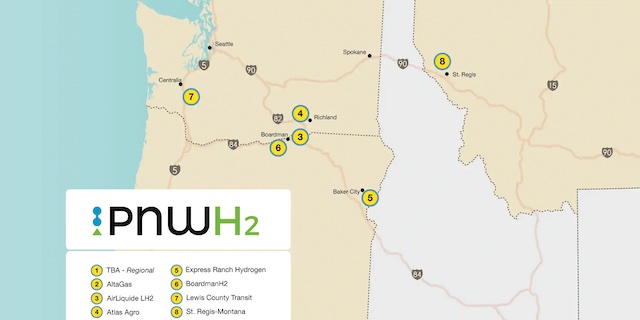Hydrogen Hub plans move forward across Pacific Northwest
Published 9:05 am Monday, June 23, 2025
BOARDMAN — Clean energy projects across the Pacific Northwest are moving forward despite a tepid — or worse — attitude toward the idea from the federal government.
In Morrow County, one such project is the Pacific Northwest Hydrogen Hub, which was one of seven billion-dollar projects funded nationally by the Bipartisan Infrastructure Law passed in 2021 during former President Joe Biden’s administration. The hub will establish multiple nodes, including one in Boardman, to help produce hydrogen to use for energy storage as well as fuel.
The Boardman node will use a process called electrolysis, which uses electricity to isolate hydrogen molecules for energy production and storage uses. If the input of electricity uses energy from renewable sources, such as wind or solar power, the output is called “green hydrogen,” as it uses no carbon to produce the hydrogen.
Producing green hydrogen
According to Janine Benner, director of the Oregon Department of Energy and board chair of PNWH2 — the organization overseeing the hub’s development — hydrogen is a “ key greenhouse gas reduction decarbonization strategy” for the state. Historically, she said, it’s been produced using fossil fuels, but with electrolysis, the process can use clean energy instead.
“You get the electricity when renewable energy is plentiful, so when the sun is shining and the wind is blowing right, and then you use that electricity to create the hydrogen,” she said, “which you can then store and use to generate electricity when renewables are not available.”
The hydrogen is stable enough to store energy long term, as compared to other storage options. Green hydrogen storage can thus be useful in regions, including Eastern Oregon, where there may be surges of electricity needs.
“The Northwest is anticipating skyrocketing electricity demand,” said Benner. “With the data centers that are coming and increased electrification, we know we’re going to need a lot more electricity generation and we’re going to need it to be there at all times.”
However, producing hydrogen through electrolysis does take a lot of energy. The Pacific Northwest Hydrogen Association said using renewable energy as the input for electrolysis makes the up-front energy requirements less taxing, as the region’s renewable energy capacity is expanding.
“We expect that the growth in hydrogen production and use will be accompanied by growth in new renewable capacity and transmission systems across the region,” the association said. “Our projects are working closely with renewable electricity project developers to ensure a stable, growing supply of clean energy is available to meet hydrogen production needs.”
Economic impact
For the project, the first phase of four is still underway, with about $27.5 million given to the hub to start developing a plan. Benner said the board recently applied to move on to phase two, which would consist of community outreach and design finalization.
The U.S. Department of Energy continues to work with the hub, but it’s possible due to changes in priority at the federal level, the project will stall.
“I’m pretty optimistic that the new administration is gonna find a lot to like about the hydrogen hubs program and the Pacific Northwest Hub, specifically,” said Benner, “because we approach it in Oregon as a decarbonization strategy, but there’s so many other great things that hydrogen can do that I think may be more appealing to the current administration.”
Benner said hydrogen production helps with energy security, resilience and independence at the same time as bringing foreign investment money into the United States. Because of the bipartisan support for the seven hubs, which are located in both Democratic- and Republican-leaning states, Benner said she is hopeful that the administration will support the project. Plus, the Pacific Northwest hub expects to create 10,000 jobs over the course of the regional project.
In Boardman, specifically, the project is expected to create more than 18 months of construction work, including a variety of trades, general construction, project management and support roles, according to the Pacific Northwest Hydrogen Association. Ongoing operations would include plant management and maintenance jobs.
Benner said “if and when” phase two begins, the hydrogen association will be engaging with the community to discuss “community benefits” and specific jobs that will be available. The association also plans to work with colleges and universities to develop apprenticeships and other programs that would prepare people for employment at one of the hub locations.
Jobs building the hub in Boardman will really pick up in about two to four years, during phase three, said Benner.
“The project is particularly exciting from an energy perspective,” she said. “We’ve identified the need to be filling some of the future electricity needs with low carbon fuels, which hydrogen is.”


